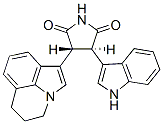All AbMole products are for research use only, cannot be used for human consumption.

Tivantinib (ARQ 197) is a selective and oral small-molecule inhibitor of c-Met with a minimal IC50 value of 0.1 μM. c-Met, a key cell surface receptor tyrosine kinase involved in diverse regulatory functions, is often aberrantly activated in human cancers. While the precise mechanism of action of ARQ-197 remains undefined, data from preclinical studies have demonstrated that ARQ-197 inhibits c-Met activation in numerous human tumor cell lines and specifically targets c-Met in various cancer types; uniquely, Tivantinib (ARQ 197) inhibits c-Met in a non-ATP-competitive manner. Phase I/II clinical trials demonstrated promise in terms of both tolerability and tumor response. Intriguingly, dose-limiting adverse effects were hematological in nature. Combinational trials are also ongoing to take advantage of the signaling crosstalk between c-Met and other oncogenic signaling systems. Prioritization of the clinical development of c-Met inhibitors, such as ARQ-197, among different tumor disease types is a key challenge at present; an improved understanding of the prediction of molecular determinants in tumors with respect to c-Met kinase as the driver oncogenic receptor, and of the prediction of tumor response, is still urgently needed.
| Cell Experiment | |
|---|---|
| Cell lines | SK-MEL-28, NCI-H661, NCI-H446, DLD-1, A549, SK-OV-3, NCI-H460, A375, NCI-H441, HT29, MKN-45, and MDA-MB-231 cells |
| Preparation method | Cell proliferation assay Cells were seeded in 96-well plates overnight in a medium with 10% FBS. Each cell line was optimized for seeding cell number to ensure a similar degree of confluence at the end of the experiment in nontreated (control) wells. The next day, cells were treated with different concentrations of ARQ 197 for 24 hours at 37°C. After ARQ 197 treatment, the drug-containing medium was removed, and cells were washed twice with PBS and incubated in a drug-free medium for an additional 48 hours. Cells were then incubated and stained for 4 hours with the MTS reagent (final concentration of 0.5 mg/mL; Promega) per well and were lysed. The results were quantitated by spectrophotometry at λ = 450 nm. |
| Concentrations | 0.03–10 μmol/L |
| Incubation time | 24 h |
| Animal Experiment | |
|---|---|
| Animal models | athymic mice bearing HT29, MKN-45, or MDA-MB-231 tumor xenografts |
| Formulation | polyethylene glycol 400/20% Vitamin E tocopheryl polyethylene glycol succinate (60:40) at 30 mg/mL |
| Dosages | 200 mg/kg for 5 consecutive days weekly for four cycles |
| Administration | orally |
| Molecular Weight | 369.42 |
| Formula | C23H19N3O2 |
| CAS Number | 905854-02-6 |
| Solubility (25°C) | DMSO 64 mg/mL |
| Storage |
Powder -20°C 3 years ; 4°C 2 years In solvent -80°C 6 months ; -20°C 1 month |
| Related c-Met Products |
|---|
| Zurletrectinib
Zurletrectinib (ICP-723) is a potent tyrosine kinase inhibitor. Zurletrectinib serves as an antineoplastic agent. Zurletrectinib can used for research of TRK-mediated related diseases. |
| ABN401
ABN401 is a highly potent and selective ATP-competitive c-MET inhibitor with an IC50 value of 10 nM. |
| (Z)-Semaxanib
(Z)-Semaxanib is a potent tyrosine kinase inhibitor. |
| MET kinase-IN-2
MET kinase-IN-2 is a potent, selective, orally bioavailable MET kinase inhibitor with an IC50 of 7.4 nM. |
| BMS-817378
BMS-817378 is a potent and selective inhibitor of MET with IC50 of 1.7 nM. |
All AbMole products are for research use only, cannot be used for human consumption or veterinary use. We do not provide products or services to individuals. Please comply with the intended use and do not use AbMole products for any other purpose.


Products are for research use only. Not for human use. We do not sell to patients.
© Copyright 2010-2024 AbMole BioScience. All Rights Reserved.
